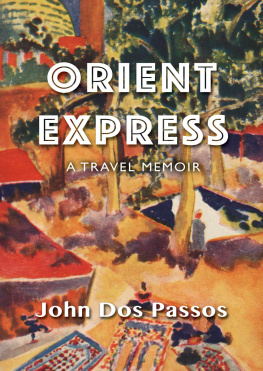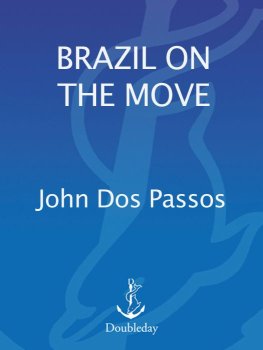Orient Express
A Travel Memoir
John Dos Passos
With illustrations in color from paintings by the author
I. EASTWARD
1. Pico
Hoity-toity
Cha de noite
Seas still high
An skys all doity
they sang as they propped themselves against the bar and fought seasickness with madeira. On the bench opposite the other passengers sat in a row with green faces. Every long roll of the Mormuga ended in a lurch and a nasty rattling of busted clockwork from the direction of the engineroom. Outside, the wind yelled and the spray flew as the boat wallowed deeper and deeper in the trough of the sea; inside, the madeira got lower and lower in the dark amber bottle and the eastbound Americans sang louder and louder into the twitching pea-green faces of the other passengers propped in a row
Seas still high
An skys all doity.
Later we are driving along over a huge easy gradual swell with a moist west wind behind us. The madeira is all drunk up. Sky and sea are blurred in a great sweeping scud, silver as thistledown in the hidden moonlight. In that scud the shoving wetnosed wind is carrying spring eastward to fall in rain on Lisbon, San Vicente, Madrid, to beat against windows in Marseilles and Rome, to quicken the thrusting sprouts in weedy cemeteries in Stamboul. Now and then the scud breaks and a tiny round moon shows through among whorls and spirals of speeding mist that thickens into sagging clots and thins into long spaces bright and crinkly as tinfoil.
The bow quivers as it nuzzles deep into each new lunging hill. A squall hides the moon and spatters my head nervously with rain and rushes on leaving some streaks of clear moonlight eastward where the islands are. Then we are driving along muffled in thistledown mist again. I have fallen asleep huddled in the V of the bow.
When I open my eyes the wind has stopped. Only a few patches of scud swirl eastward overhead. The huge swells are bright and heavy like mercury in the still moonlight. It isnt a sound coming across the water, its a smell, a growing fragrance beating against my face on a burst of warm air out of the east, a smell of roses and dung burnt by the sun, a rankness like skunk-cabbage overlaid with hyacinth, pungence of musk, chilly sweetness of violets. Hours later, eastward we made out, wrapped in clouds, the dark cone of Pico.
2. Terminus Maritime
At Ostend the boat for the Continent lands alongside of a tall black hotel. After they have gone through the customs and had their passports stamped the passengers for Central Europe and the Orient file through the tall tragic black doorway into a vast restaurant thinly sprinkled with round tables. They sit at the tables and a sound of talk in various languages drifts up into the high coffered ceiling and out over the dark squares of the rainlashed harbor. People order food and eat it hurriedly with an occasional nervous glance at the clock. Having eaten they take their places, which they have previously reserved with pieces of baggage, in the various trains. The trains are rather empty, all the lean windows of the hotel are closed with dark grey shutters, the great squares of the harbor are empty. A conductor with gold braid on his cap paces back and forth on the platform, occasionally stroking the bristles of a rusty moustache.
At the other end of the platform beside a slot machine is a large thermometer constructed, so it announces in red letters, by Monsieur Gupratte, that gives you the chilliness in Centigrade, Fahrenheit, and Raumur degrees and adds little informatory mottoes such as that 60 is the mean temperature of Pondichry, that 35 is best for an ordinary bath, that silkworms are happiest at 25, and also sickrooms.
It is not traintime yet. The eastbound American goes back through the portals of doom into the empty restaurant where in the arctic stillness a lone waiter stands beside a table teetering like a penguin. He sits down beside the waiter and orders a brandy and soda, telling himself with passionate melancholy that 60 is the mean temperature of Pondichry. If its sixty in the shade in Pondichry how cold does it have to be to freeze vodka in Nijni Novgorod? Answer me that Michel Strogoff.
Through the doorway I can read the bronze letters on the wet side of the sleeping car, Compagnie Internationale des Wagons Lits et des Grands Expresses Europens. A gust of wet air slaps me in the face from time to time, bringing a smell of varnish and axlegrease and couplings, a smell of departure and distance that evokes a very small boy being coaxed trembling onto a new huge shining train in a shed somewhere. A train fresh painted fresh varnished that smells like new rubber balls, like tin toys, like sewing machines, a train that is going to start but that never starts. Were going to move. The engine whistles long. Were off. No its only the walls moving, towns and mountains and trees and rivers moving: Panorama of the Trans-Siberian.
En voiture messieurs, mesdames. The eastbound American is yanked to his feet, spills money for his drink onto the table, runs out through the tall portal down the wet platform, boards the train that has begun very slowly to move.
3. Luna
Dinner alone beside a pink and yellow lampshade (categoria de lusso), out of the window the colored postcard of San Giorgio Maggiore. Venice the Coney Island of Coney Islands, the Midway of history built for goggle-eyed westerners out of the gaudy claptrap of the east, and through it all the smell of tidewater, rotting piles, mudflats, a gruff bodysmell under the lipstick and perfume and ricepowder, a smell desolately amorous like chestnut blooms, like datura, like trodden cabbages. Women passing on the quai wear their hair fluffed up the way the prostitutes in Carpaccios pictures do, and long black silk shawls with fringes longer than the fringes of the shawls of the women of Seville; their skin is a firm yellowish color and they have straight ivory noses. An occasional flicker of lightning behind the dome and tapering tower of San Giorgio reveals the fact that it is merely a cutout, that the water is an excellently contrived effect, that the people on the quai are an opera chorus intermingled with a few supers, that the moon is a baby spot.
I hustle out of the restaurant for fear the act will be over, walk hastily along overhung streets, over humped bridges, down alleys where through tavern doorways you can see people drinking at long varnished tables. Red-haired girls behind bars, drunken men playing guitars in front of a cathouse by the waterside, clanging smells of wine and garlic; in every direction spaghetti-tenors singing in boats. In the piazza an orchestra playing William Tell for all its worth, on the Grand Canal Santa Lucia carried high by a soprano above a croaking of fat basses. In the sky the electrician has killed the moon. I can make out the big and the little Dipper in a spangled black cyclorama. In the canals the ripple of water would be as excellently imitated as in the Nile scene from Aida, if it werent for the inexorable smell of the tide creeping up slimecovered steps, of mudflats and waterlogged barges, chilly hands of the Adriatic groping for your throat.
Florians; broad shirtfronts of waiters, icecream-colored parasols, women in fluffy summer clothes, white flannels, under a grey sky that someone at the top of the Campanile has suddenly filled with fluttering green, pink, yellow papers that ultimately light among the tables announcing Lullis toilet articles. Young men swagger in fours and fives through the crowds singing Giovanezza, giovanezza. Somewhere behind the ornate facades, in alleys hidden away so as not to scare the tourists, there is fighting going on. There is something in the air that makes you uncomfortable in the aviary twitter of Florians. On every bare wall there are signs VV LENIN or M LENIN. I wander irresolutely about over the marble pavements through the dying light of a yellow sunset. A boat with an ochre sail that has a great crimson patch in the middle of it proceeds slowly across the daffodil water, a black barge with four men rowing in effortless unison crawls away towards the Lido. Under an archway behind me some people are looking at a pasquinade scrawled in black chalk. The words are in English in thick rounded letters:











